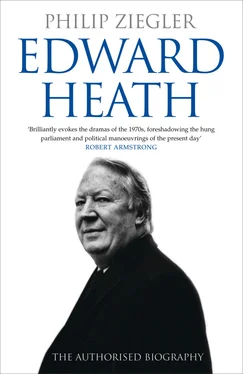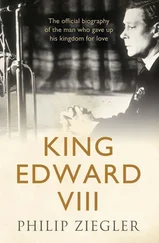In June 1960 Heathcoat-Amory finally retired as Chancellor. In the reshuffle that followed Heath was moved to the Foreign Office, to serve as Lord Privy Seal, with a seat in the Cabinet, under the new Foreign Secretary, Alec Home. When Heath became Minister of Labour his one stipulation had been that he should serve for the full period of the Government; now he was to be transplanted before he had been able to do more than start on what he thought was necessary. With Home in the Lords, however, he would speak for the Foreign Office in the Commons and, still more important, would be in charge of Britain’s relationship with Europe. If any other Foreign Secretary had been involved Heath might have had doubts, but he liked and trusted Home and believed that they would work successfully together. Some people predicted dire consequences from the divided leadership but James Stuart, always one of Heath’s most ardent admirers, reassured him. ‘I quite like the idea of FO in the Lords’, he wrote, ‘because the Commons mustn’t get into the way of regarding themselves as entitled to all important posts. Also, from your own personal future angle, it should be of great value to you to get the experience of another most important Department and to have to run important debates in the House.’ For Heath it was the prospect of negotiating British entry into Europe that was above all enticing. He had no doubt that he must accept the challenge. But he left Labour with regret. ‘I know you’ll do a first-class job,’ wrote Vic Feather, ‘which is why I rather wish you’d had another year or so at the Ministry of Labour where you’d so quickly won the respect and confidence of the unions. Anyway, there it is – from one hot spot to another!’ 8
Though Europe was to be at the centre of Heath’s time at the Foreign Office, it was by no means his only responsibility; indeed, for several months, it made relatively few demands on his time. In Cabinet Home tended to take the lead when any subject except Europe was under discussion but Heath would often accept responsibility when the countries of the Gulf, particularly Bahrain or Kuwait, were causing problems. He visited both states and considered himself something of an authority on the area; allegedly assuring the immensely experienced Sir William Luce, then Resident in Bahrain, that he understood how the Arabs thought and needed no advice on the subject. 9Otherwise he filled in for Home whenever the Foreign Secretary was out of the country or otherwise engaged. When Madame Furtseva visited London she became increasingly discontented with her programme and finally went on strike when required to visit Henry Moore’s studio – ‘It would be quite inappropriate for a Soviet Minister of Culture to inspect the work of a sculptor who put holes in people.’ Heath came to the rescue, took her to Wimbledon and the ballet and invited her to visit him in his new flat – the first time she had ever entered a British home. But though there were occasional compensations, the work was far less interesting and the responsibilities less serious than had been the case at the Ministry of Labour. Nor did his performance in the House of Commons do much for his reputation. ‘He seems to lack authority and grasp of his subject,’ said the MP for Berwick-upon-Tweed, Lord Lambton – a comment that reflects more on the amorphous nature of his job than the merits of his performance but still makes it clear how difficult it was for Heath to shine when presenting someone else’s case on issues which were not under his control. In the Sunday Graphic in July 1960, the Tory MP Gerald Nabarro had tipped ‘the tough, imperturbable Edward Heath’ as a future Foreign Secretary. A few months later he had slipped back in the stakes so far as future promotion was concerned. 10
The setback was only temporary. Heath’s real work at the Foreign Office more than restored his reputation. When he was appointed Lord Privy Seal he was known to be well-disposed towards Europe and critical of the Labour Government’s failure to move towards the Common Market, but he was not generally held to be – to use the phrases current some fifty years later – a Europhile, still less a Eurofanatic. Once Macmillan had taken the decision to apply for British entry and had charged Heath with the task of negotiating acceptable terms, however, what he had always felt would be a most desirable step forward became for him the Holy Grail. Heath became totally committed to the concept of Britain as an integral part of Europe and fought for it tenaciously until the day he died.
To a remarkable extent the decision to apply for British membership was made by Macmillan alone. He had, of course, to take the Cabinet with him but it was he who led and the rest who followed. The crucial moment probably came in January 1961 when Macmillan returned from a meeting with the French President, de Gaulle, at Rambouillet to report that there were ‘some grounds for thinking that it might now be possible to make some further progress towards a settlement of our economic and political relations with Europe’. There were, he said, ‘powerful influences in favour of the development of a close political federation in Europe’. De Gaulle was resolutely opposed to any such development. He believed that the United Kingdom by and large shared his views and would be a useful ally in the battle against the federalists. While there was no guarantee that de Gaulle would welcome British entry it was at least possible that he would not oppose it. It might therefore be best to seek a settlement while de Gaulle was still in power. The Cabinet enthusiastically agreed that steps should at once be taken to see if the way could be made clear for British entry. 11
But what did entry into Europe mean? In Britain, wrote Heath in 1967, ‘a myth has become fashionable that we were concerned only with economic affairs…Nothing could be further from the truth. The main purpose of the negotiations was political.’ Robert Marjolin, one of the two French Commissioners on the first European Commission, called on Heath in the House of Commons in March 1961. The EEC ‘was not an end in itself but only a stage on the road to a wider political union’, he said. The question was not whether the British wished to be associated with the Community as it was today but as it would be in the future. The UK, Heath replied firmly, ‘had always made it clear that they regarded the…question as primarily political’. The historian Keith Middlemas has suggested that Heath more than any other Conservative minister recognised the full implications of this concept and accepted ‘how great and painful the adjustments would have to be’. Probably this is true, but he shared his vision with the Lord Chancellor at least. ‘I am myself inclined to feel’, he told Lord Kilmuir, ‘that we have allowed ourselves to be over-impressed by supranationality, and that, in the modern world if, from other points of view, political and economic, it should prove desirable to accept such further limitations on sovereignty as would follow from the signature of the Treaty of Rome, we could do so without danger to the essential character of our independence and without prejudice to our vital interests.’ Kilmuir replied that he thought it would be difficult to persuade parliament or the public to accept any substantial surrender of sovereignty. ‘These objections ought to be brought out in the open now because, if we attempt to gloss over them at this stage, those who are opposed to the whole idea of our joining the Community will certainly seize on them with more damaging effect later on.’ 12
Heath accepted the argument, but with reservations. It might be undesirable to let this sleeping dog lie altogether, but there was no need to wake it too energetically. The emphasis when arguing the case in public should be on the immediate advantages to be gained from British entry and the damage that would be done by staying out; not on a hypothetical threat to national sovereignty that might or might not arise in the distant future. When the issue of sovereignty did arise, Heath played it down. Speaking at a private meeting in Chatham House in October 1961, he emphasised that any move towards federation could only come about with the unanimous support of all the members: ‘Therefore the position of those who are concerned from the point of view of sovereignty is completely safeguarded.’ That he believed this to be true is certain; that he privately considered that when the time did come the arguments in favour of some surrender of sovereignty would prove irresistibly strong is no less clear. This was not the moment to argue that case, however. He did not seek actively to mislead the British public about his expectations, but he did not feel it necessary or desirable to spell out the full implications of British entry in any detail. 13
Читать дальше












